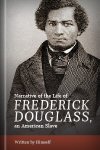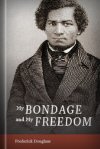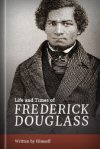Frederick Douglass Collection (3 vols.)
Digital Logos Edition
Overview
In the 1860 census, the United States claimed just under four million slaves. Knowledge of slavery’s legacy of suffering and injustice has been a vital facet of the American consciousness ever since. Perhaps no one has written so powerfully, or personally, on the subject than Frederick Douglass. Douglass, who learned the alphabet illegally from his master’s wife and successfully escaped to the north on his third attempt, went on to be one of the most important figures in the abolitionist movement. This collection features three autobiographical works from the great reformer, writer, and orator, including the rhetorical tour de force, Narrative of the Life of Frederick Douglass. 150 years later, reading Frederick Douglass remains one of the best ways to learn about slavery in the United States.
The Logos edition of these valuable volumes are enhanced by amazing functionality. Study Douglass’ texts alongside a library of classic literature and philosophy. Important terms link to dictionaries, encyclopedias, and a wealth of other resources in your digital library. Powerful searches help you find exactly what you’re looking for. Tablet and mobile apps let you take your study with you. With Logos Bible Software, the most efficient and comprehensive research tools are in one place, so you get the most out of your study.
This title is included in the following collections
You can save when you purchase this product as part of a collection.
Black Voices Expansion, L
$299.99$299.99

Key Features
- Classic narratives from Frederick Douglass
- All three of Douglass’ autobiographies
- Unparalleled insight into the culture of American slavery
Product Details
- Title: Frederick Douglass Collection
- Author: Frederick Douglass
- Volumes: 3
- Pages: 1,306

Narrative of the Life of Frederick Douglass is one of the most important works in all American Literature. Debuting in 1845, Frederick Douglass’ first autobiography, was an immediate sensation as well as a critical and commercial success. The Narrative vividly documents Douglass’ time as a slave and his journey to freedom. It was instrumental in the American abolitionist movement.
This narrative contains many affecting incidents, many passages of great eloquence and power . . . Who can read [it], and be insensible to its pathos and sublimity?
—William Lloyd Garrison, American abolitionist and editor, The Liberator

My Bondage and My Freedom is Frederick Douglass’ second autobiography. Originally published in 1855, it is divided into two parts—“Life as a Salve,” and “Life as a Freeman.” It includes the details of his time abroad in Ireland. This edition includes an introduction by the American physician and abolitionist James McCune Smith.

Life and Times of Frederick Douglass is Douglass’ third and final autobiographical volume, published in 1881. In addition to a more detailed description of his sufferings in slavery, it is his only work describing his time during and after the Civil War, including his encounters with Abraham Lincoln and his time as a U. S. Marshal.
About Frederick Douglass
Frederick Douglass was born a slave in the winter of 1818 (as he states in the opening lines of his Narrative, “by far the larger part of the slaves know as little of their ages as horses know of theirs”). His master’s wife taught him the alphabet, though it was illegal to teach slaves to read. After Douglass was cut off from this source, he continued in secret to read all the newspapers, pamphlets, and books he could find. After repeated failed attempts, he escaped north by train to a safe house in Pennsylvania.
Douglass published his masterful Narrative of the Life of Frederick Douglass in 1845, which was a critical and commercial success. Not being legally free, his fresh celebrity led him to flee to Ireland. Shortly after, British supporters purchased his freedom. After two years abroad he returned to America and began producing several abolitionist newspapers, including The North Star. He became one of the most famous black men in America and devoted his life to the abolitionist cause and suffrage for both black people, and women. Douglass suffered a massive heart attack or stroke on February 20, 1895, hours after receiving a standing ovation at a meeting of the National Council of Women.
Reviews
4 ratings
J-P O
2/13/2020

Larry Proffitt (I
3/7/2015

Allen Bingham
2/27/2015

Larnell Mormon
8/22/2014
A must read. A necessary part of any truly historical library of America.
Faithlife User
2/14/2014
Everyone should read Douglass’ works, for his deep eloquence, his natural kindness, and his inspirational story.